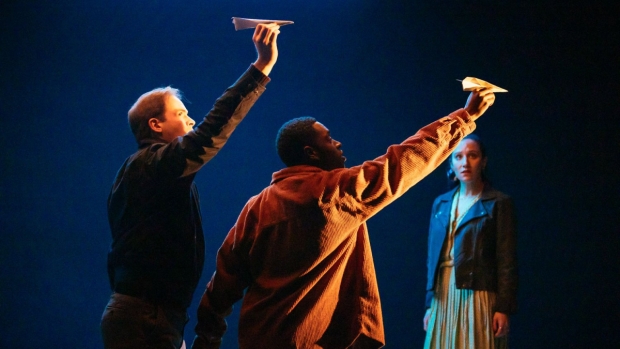The Winston Machine at New Diorama Theatre – review
The production continues its run through to 19 February

© Cesare De Giglio
It's the ‘40s but also the present day in Kandinsky's new bio-drama, commissioned by the New Diorama Theatre. Devised by the performers, The Winston Machine follows Becky (Rachel-Leah Hosker), a millennial woman obsessed with the second world war due to her grandparents meeting during it – he an RAF pilot and her a plane plotter. She dresses in the style, has a popular Instagram account dedicated to the time period and sings wartime ballads at re-enactment events, often organised by her Dad (Hamish Macdougall). But underneath the nostalgia, she's trapped in a nuclear relationship and unsure of her life. When old school pal and crush Lewis (Nathaniel Christian) drops back into her life, her spark reignites but she is also faced with some tough questions about her lifestyle and hobbies. The wartime and present-day narratives run in parallel, with the three actors taking on roles from both periods.
James Yeatman stages the play on a slanted wooden platform surrounded by dining chairs (co-designers are Joshua Gadsby and Naomi Kuyck-Cohen). In movement sections, the cast hovers around each other like, and with, paper planes, flirting with the space from the chairs. Coupled with Hosker's haunting voice, it's visually arresting stuff, and the moments when the show dips into the surreal is when it becomes the most exciting. Composer Zac Gvirtzman and sound designer Kieran Lucas team up to deliver a mesmerising soundtrack.
The company members are working hard during the show to keep both timelines up in the air. Hosker gracefully balances the roles of a working wartime woman and a contemporary one, with all the distractions of modern life. Social media comments, adverts and messages are infused in some of her speeches to highlight these distractions, and it's refreshing to see technology presented in such a human way (literally, it is for the most part just the voices of the actors), coming as thick and fast as the story changes timeline. Hosker's chemistry with Christian as lover Bill and school pal Lewis in both timelines is lovely, with the pair's hamming up of the drama of a wartime romance not earning enough laughs from the audience. Macdougall has the trickier job of playing the more unsympathetic characters in the show, including Becky's boring fiancé and her Facebook-commenting patriot Dad, and provides a lot of the light relief at the top of the show.
It's certainly a challenging piece for audiences, not only due to the switching timelines but the heavier topics, such as the fetishisation of the war, which are broached in the final portion of the show. The play seems comfortably focused on Becky's domestic problems before its course abruptly changes and zooms out to these bigger themes spotlighted by her Dad and Lewis – both of which could have equally interesting shows made about them. During The Winston Machine, however, there is little pay-off as we aren't given the opportunity to spend as much time with these characters as Becky, and the sudden change of pace seems unjustified. These knottier topics deserve further exploration throughout the piece, rather than coming thick-and-fast at the tail end.
Despite this, Kandinsky has made an intriguing, fascinating show which, though not quite as "epic" as described in the blurb, is stirring to watch and exciting to see where it goes next.












